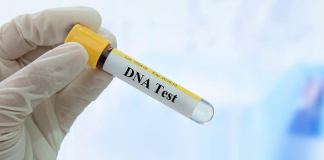I'm a 29-year-old white guy, and my wife is 30, and she's black. Together, we have two beautiful children, a 3-year-old girl and a 5-year-old boy. Our love for each other had always transcended the boundaries of race, and our family was built on the strong foundation of trust and understanding.
When my son was born, I embraced fatherhood with open arms. I held him, kissed him, and watched him grow with the same love and affection that I showered upon our daughter. In those early years, I didn't think much about our physical differences; I saw only the shared moments of joy and the love that bound us as a family.
However, as my son continued to grow, I couldn't help but notice that he looked remarkably different from me. His skin was a beautiful, rich shade of brown, much darker than my own. His hair had a different texture, and his facial features didn't bear any resemblance to mine, unlike our daughter, who displayed a blend of our traits.
Doubts began to emerge in the back of my mind, nagging at me. I knew that genetics could be unpredictable, and children often inherited a mix of their parents' traits, but the stark contrast between my son's appearance and mine started to chip away at my confidence. I struggled with these doubts in silence, feeling torn between my love for my son and the questions that kept resurfacing.
One day, consumed by my insecurities, I made a decision that would later haunt me. I ordered a secret paternity test online, hoping that it would either put my doubts to rest or confirm my fears. It was a move I knew was wrong, a betrayal of the trust I had shared with my wife.
The day the test results arrived, I sat in my study, trembling with anxiety, as I unfolded the document. The truth stared back at me, stark and irrefutable. The test results showed that my wife was indeed the biological mother of our son. A mixture of emotions swelled within me—relief, guilt, and shame. I had invaded my wife's privacy, and I had let my doubts overshadow the love I had for my family.
The weight of my actions bore down on me, and I knew I needed to come clean to my wife. It was a difficult conversation, filled with tears, anger, and a deep sense of betrayal. I apologized profusely, expressing my love for her and our children. My wife, though hurt and angry, eventually forgave me. We decided to seek counseling to rebuild the trust that had been shattered.
Over time, we worked through the pain and confusion that had marred our relationship. We learned to appreciate the uniqueness of our family and embrace our differences as a source of strength. Our love prevailed, stronger than ever, and we vowed to never let doubt and insecurity divide us again. Our children, a testament to the love that knows no color, continued to flourish in the warmth and love of our united family.
When my son was born, I embraced fatherhood with open arms. I held him, kissed him, and watched him grow with the same love and affection that I showered upon our daughter. In those early years, I didn't think much about our physical differences; I saw only the shared moments of joy and the love that bound us as a family.
However, as my son continued to grow, I couldn't help but notice that he looked remarkably different from me. His skin was a beautiful, rich shade of brown, much darker than my own. His hair had a different texture, and his facial features didn't bear any resemblance to mine, unlike our daughter, who displayed a blend of our traits.
Doubts began to emerge in the back of my mind, nagging at me. I knew that genetics could be unpredictable, and children often inherited a mix of their parents' traits, but the stark contrast between my son's appearance and mine started to chip away at my confidence. I struggled with these doubts in silence, feeling torn between my love for my son and the questions that kept resurfacing.
One day, consumed by my insecurities, I made a decision that would later haunt me. I ordered a secret paternity test online, hoping that it would either put my doubts to rest or confirm my fears. It was a move I knew was wrong, a betrayal of the trust I had shared with my wife.
The day the test results arrived, I sat in my study, trembling with anxiety, as I unfolded the document. The truth stared back at me, stark and irrefutable. The test results showed that my wife was indeed the biological mother of our son. A mixture of emotions swelled within me—relief, guilt, and shame. I had invaded my wife's privacy, and I had let my doubts overshadow the love I had for my family.
The weight of my actions bore down on me, and I knew I needed to come clean to my wife. It was a difficult conversation, filled with tears, anger, and a deep sense of betrayal. I apologized profusely, expressing my love for her and our children. My wife, though hurt and angry, eventually forgave me. We decided to seek counseling to rebuild the trust that had been shattered.
Over time, we worked through the pain and confusion that had marred our relationship. We learned to appreciate the uniqueness of our family and embrace our differences as a source of strength. Our love prevailed, stronger than ever, and we vowed to never let doubt and insecurity divide us again. Our children, a testament to the love that knows no color, continued to flourish in the warmth and love of our united family.



